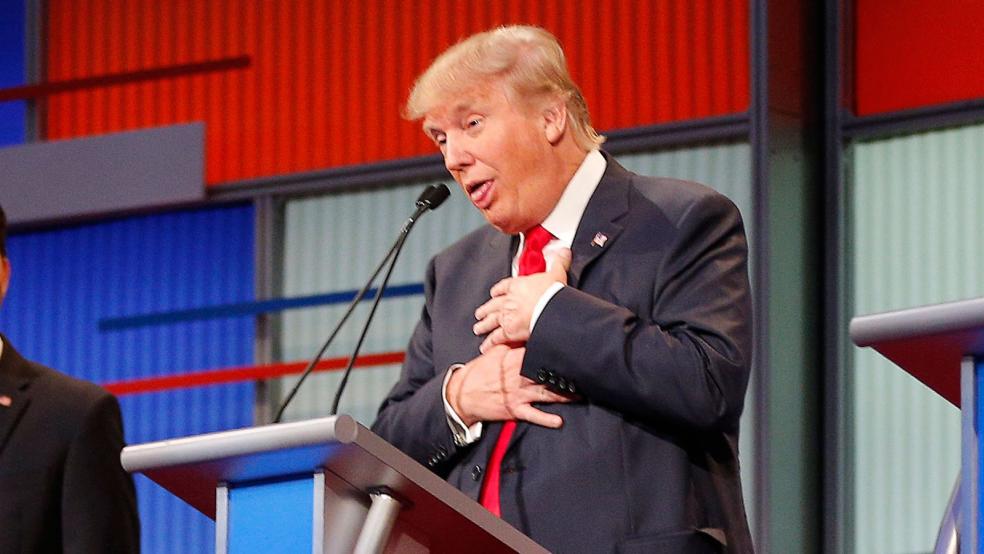It’s always risky to underestimate Donald Trump’s resiliency. And from the looks of the top lines of the latest polling in New Hampshire and Iowa, the boisterous, combative billionaire is no worse for wear after the raging controversy over his performance in last Thursday night’s nationally televised GOP presidential debate.
Trump leads the GOP pack in New Hampshire with 18 percent of likely Republican voters, according to a new Franklin Pierce University/Boston Herald poll. He is followed by former Florida governor Jeb Bush with 13 percent, Ohio Gov. John Kasich with 12 percent, Texas Sen. Ted Cruz with 10 percent and former Hewlett-Packard CEO Carly Fiorina.
Related: Who Will Be the First to Drop out of the GOP Presidential Sweepstakes?
In Iowa, home to the nation’s first political caucus, Trump does equally well, claiming 17 percent of likely GOP caucus goers, ahead of Wisconsin Gov. Scott Walker with 12 percent, Florida Sen. Marco Rubio with 10 percent, former neuro-surgeon Ben Carson with 9 percent, and Cruz and Fiorina with nine percent each, according to a new Suffolk University poll.
Notably, Trump moved past Walker in Iowa, where the Wisconsin governor has garnered significant conservative support since January with his tough anti-union talk and calls for a smaller federal government. And he topped Bush in New Hampshire, where the former Florida governor is counting on strong support from more middle-of-the road, establishment Republicans to eventually put him over the top.
But for all his bluster and brash predictions to supporters that “You will love President Trump,” the latest polling suggests that Trump has begun to slip a bit – especially in Iowa, where a third of Republicans have unfavorable views of him and many voiced concern about his behavior during and after last Thursday night’s debate.
The latest Rasmussen Reports national telephone survey shows Trump with 17 percent support among likely Republican voters, the same as he is doing in the early primary and caucus states. But that is down from 26 percent in late July, before the GOP debate in Cleveland. Rubio and Bush are in second place with 10 percent each. That puts them in a near tie with Fiorina and Walker, who each garnered nine percent of the likely primary vote.
Related: While Trump Whirls and Rages, Cruz Stays the Course
Last week, Trump famously clashed with Fox News moderator Megyn Kelly for raising questions about his past degrading comments about women, and he later suggested publicly that Kelley was menstruating when she “unfairly” went after him during the nationally televised debate.
The Iowa survey suggests that Rubio, Carson and Fiorina all benefitted from their performances among those who had watched the debates, and that Trump’s lead was higher among those voters who didn’t see it. However, for those who did watch the raucous two-hour debate, 55 percent said they are now less comfortable with Trump as a candidate for president, while 23 percent said they are more comfortable.
What’s more, a 54 percent majority disagreed with Trump’s complaints that he was treated unfairly by the Fox News moderators, and a third of Republicans say that Trump “doesn’t show appropriate respect for women.” However, about 46 percent of the respondents agreed with Trump in saying that criticism of his comments about women "are just examples of political correctness."
Related: Trump--What Doesn’t Kill Him Makes Him Stronger
These findings are telling, and suggest that while Trump is successfully tapping into the anger and resentment of a lot of voters towards their government, his shoot-from-the-lip style and brutish comments about almost anyone who disagrees with him could seriously undercut his drive for the GOP nomination. A few more bad performances in the upcoming GOP debates could result in a dramatic change in fortune for the Trump campaign.
"In the absence of a debate, Trump's lead widens because he swallows up the political oxygen, but when that oxygen is spread out more evenly in a debate, it breathes life into the other candidates, and the race gets closer," said David Paleologos, director of the Suffolk University Political Research Center in Boston.





